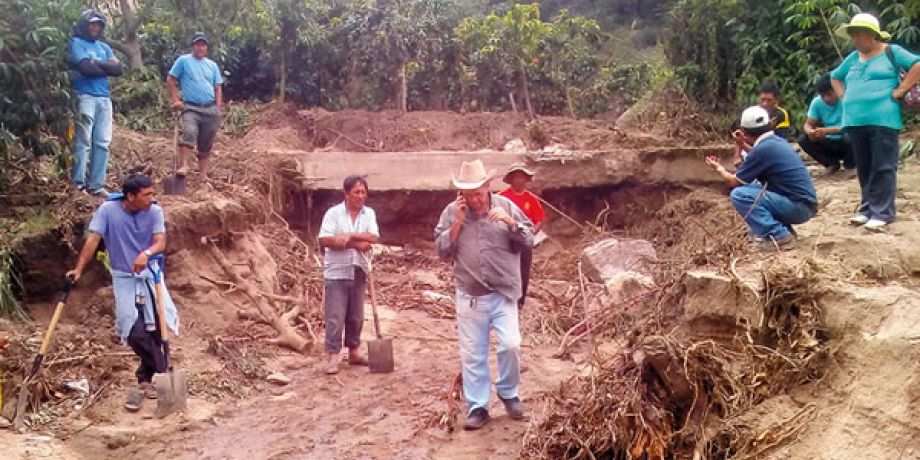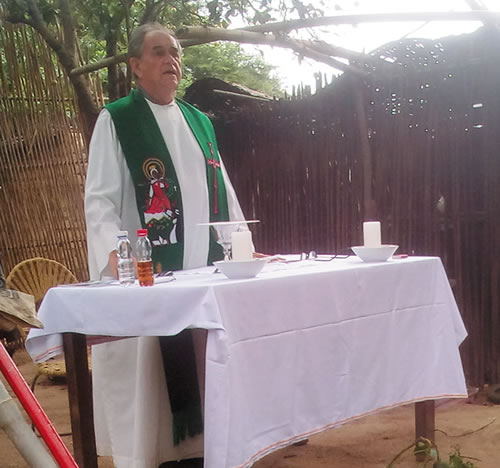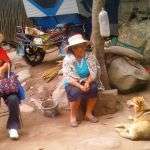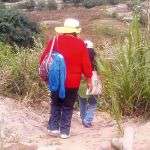
God's Light Shining Brightly
It was a hot, sunny day in February when we four seminarians and four lay people from the Columban Mission Collaborators (CMC) set out to prepare for a month of mission in the north of Lima, Peru. After seven hours of traveling we finally managed to reach the small town we would come to know as Jimbe, a small community of people comprised mainly of farmers. As we started out our first week of visitation I noticed even though it was a desert there was still life in these communities, life in both the sense of the land and also the people. If anyone were to drive up from Lima, they would notice just sand and more sand, but as they enter the junction driving uphill to Jimbe, they would notice channels of water running along the road and into sugar cane fields and mango fields and then avocado

I had a similar experience with the people of Jimbe. When we set out to visit the people in villages of Santa Rosa, Macracancha, and El Arenal we saw poorly built houses with rooftops that could not prevent water from entering in, even though it is known to rain at least three times a week in that district. We saw houses that were destroyed from soil erosion and floods. We observed all of these realities and heard a lot of stories from the people themselves as well as from their parish priest Fr. John Davis. Fr. John warned us not to be deceived by the beautiful design of the houses because some houses may be appealing on the outside but are bare on the inside, meaning no furniture or even mattresses. Some families had had to sleep lying on the floor with children on the arms of their mothers trying to keep warm at night. At first glance, I thought to myself, this is truly a desert, where hope cannot possibly exist; but then I noticed the people, and how their acts of kindness to help families that had lost everything, just because they felt it was the right thing to do. I was fortunate to witness two occasions where the unity of the people proved stronger than anything that came in their path.
The first occasion came as a surprise, we received news that a water canal had burst open due to floods that came from the top of the hills and flooded fields of cassava and mangos causing soil erosion to wash into a village and destroy houses in its path. It was in a small village called El Arenal, and eventually a group of men came over from nearby villages to help. Some of us from the mission program decided to help in whatever way we could and within two to three days the canal was rebuilt and restored in good working condition allowing the water to fl ow again into the plantations. Through their perseverance they managed to maintain their farms in good health. The municipality may have helped in some ways, but I believe that without the strength and courage and their belief in the men of the villages within and around El Arenal, the canal would not have been built as quickly and as well as it had been.
The second occasion happened just a few days after the first, when they celebrated a festival called the "Yunza" which was held in Jimbe where they had a tradition of cutting a huge tree from the bottom of the hill, tying a rope onto it and as one community they would pull the tree right up to the top of the hill through the town. Strong men, young men, even old people and children would come together to help pull this big tree. I was astounded at the way they found joy and hope in the midst of sadness and loss. For some it might have been an opportunity to drink beer and just have fun, but I believe The long walk The canal for others it was a sign of their bond, their unity and their belief in each other as one family instead of separate communities on this rocky, hilly desert.
Every mission day started with a Laudes prayer with the parish priest and ended with an evening Mass usually in the main chapel in town. These prayers and Masses are key to our mission by drawing strength from the source of all creation and the reason for our mission, to continue the mission of Jesus Christ in a manner best described by Saint Francis "Preach the word of the God to the whole world, use words if necessary."
At the final Mass on Saturday night I was surprised that the main celebrant, the assistant parish priest Fr. Wilmer, asked Dong and I (because we were leaving the next day for Lima) to share a few words about our experience of mission. After consulting with my brother (Dong) I decided to take the first opportunity to thank the people for helping me to believe that God exists in Jimbe, in spite of all the danger that they face every day with natural disasters and extensive economic poverty in this small town. God still has his ways of affirming His love and presence in them. Just a few minutes before the Mass started, there was a procession of three crosses that came from the top of the hill, and they said it was also a long time tradition of the community called "Cruz del siglo" (Cross of the century). It is from this experience that I believe that dark times are just opportunities to let God's light shine brighter in a land that could easily be called dead there is life, and life abundantly.
Columban seminarian Martin Koroiciri has returned to Fiji to complete his theological studies.

